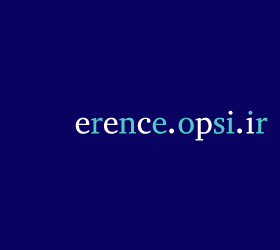Association Mission
The mission of the association is to advance the creation, communication and application of knowledge to benefit society and improve people's lives.
Membership
Contact Us
Volume 25 - ICOP & ICPET 2019
ICOP & ICPET _ INPC _ ICOFS 2019, 25 - ICOP & ICPET 2019: 253-256 |
Back to browse issues page
Download citation:
BibTeX | RIS | EndNote | Medlars | ProCite | Reference Manager | RefWorks
Send citation to:



BibTeX | RIS | EndNote | Medlars | ProCite | Reference Manager | RefWorks
Send citation to:
Keyvani hafashjani F, Borhani zarandi M, Behjat A, Jahanbakhshizadeh N, Sharifi ardani M. The effect of immersion temperature in two step deposition method on morphology of perovskite and performance of perovskite solar cell. ICOP & ICPET _ INPC _ ICOFS 2019; 25 :253-256
URL: http://opsi.ir/article-1-1918-en.html
URL: http://opsi.ir/article-1-1918-en.html
Farideh Keyvani hafashjani *1 
 , Mahmood Borhani zarandi1
, Mahmood Borhani zarandi1 
 , Abbas Behjat1
, Abbas Behjat1 
 , Naser Jahanbakhshizadeh1
, Naser Jahanbakhshizadeh1 
 , Mahdi Sharifi ardani1
, Mahdi Sharifi ardani1 


 , Mahmood Borhani zarandi1
, Mahmood Borhani zarandi1 
 , Abbas Behjat1
, Abbas Behjat1 
 , Naser Jahanbakhshizadeh1
, Naser Jahanbakhshizadeh1 
 , Mahdi Sharifi ardani1
, Mahdi Sharifi ardani1 

1- Photonics Research Group, Engineering Research Center, Yazd University, Yazd, Iran
Abstract: (2688 Views)
Organic-inorganic perovskite CH3NH3PbI3 due to their particular properties such as high diffusion lengths of charge carriers, tunable band-gap and easy construction method, use as absorbing layer in perovskite solar cells. Morphology of perovskite layer which has a direct impact on performance of solar cell, influenced by various parameters, including the conditions of deposition of perovskite layer. In this paper perovskite layer created by two step method and the effect of the immersion temperature variation on the morphology of the perovskite layer as well as the performance of perovskite solar cell investigated. Characterization of constructed solar cells showed that the immersion temperature has a significant effect on performance of perovskite solar cells. Also, constructed solar cell by immersion temperature of 25 °C has a better performance than other temperatures (0 and 50 °C).
| Rights and permissions | |
 |
This work is licensed under a Creative Commons Attribution-NonCommercial 4.0 International License. |







